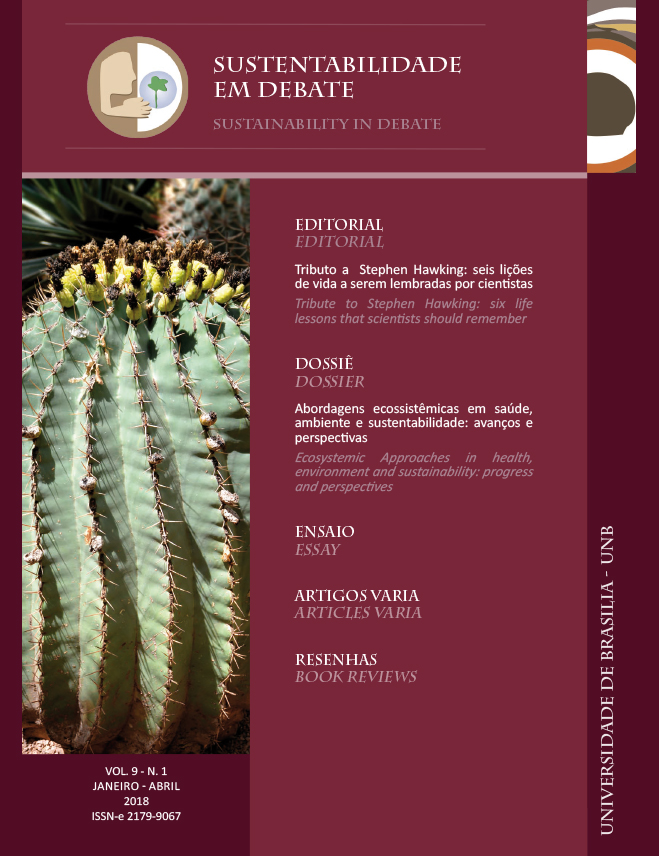Territorialities, health and environment:
connections, knowledge and quilombolas practices in Sergipe, Brazil
DOI:
https://doi.org/10.18472/SustDeb.v9n1.2018.26960Keywords:
Territorialidade, Quilombos, Saúde, Conservação AmbientalAbstract
The ecosystem approach to human health offers a theoretical and practical construction on the relations between health and environment based, among other factors, on the lifestyle of specific population groups. This study aimed to analyze how traditional principles and health care practices build territorialities that contribute to environmental conservation in quilombolas communities. Participant observation and interview with traditional healers were carried out in the communities of Mocambo and Sítio Alto, in the state of Sergipe. We identified the territoriality of resistance, the territoriality of care and the territoriality of hope as common features to both communities, in the articulation of knowledge and practices that connect health and environment. We concluded that the principles of the ecosystem approach to health were applied in the quilombolas communities and supported integrative and complex dynamics of relations between health and environment that contributed to the environmental and cultural conservation of these communities.
Downloads
References
BÂ, A. Hampaté. A tradição viva. In: KI-ZERBO, J. (ed.). História geral da África I: metodologia e pré-história da África. Brasília, DF: UNESCO, 2010. p. 167-212.
DIEGUES, A.C.; RELES, J. Povos Indígenas e comunidades tradicionais: os visados territórios dos invisíveis. In: PORTO, M.F.; PACHECO, T.; LEROY,J.P. Injustiça Ambiental e Saúde no Brasil: o mapa de conflitos. Rio de Janeiro. Editora FIOCRUZ, 2013.
LEFF, E. Saber Ambiental. Petrópolis, RJ, 2001.
LEROY, J.P.; MEIRELES, J. Povos Indígenas e comunidades tradicionais: os visados territórios dos invisíveis. In: PORTO, M.F.; PACHECO, T.; LEROY,J.P. Injustiça Ambiental e Saúde no Brasil: o mapa de conflitos. Rio de Janeiro. Editora FIOCRUZ, 2013.
LITTLE, Paul E. Territórios sociais e povos tradicionais no Brasil: por uma antropologia da territorialidade. In: REUNIÃO BRASILEIRA DE ANTROPOLOGIA, 23., jun. 2002, Gramado/ RS. Natureza e sociedade: desafios epistemológicos e metodológicos para a antropologia. [S.l.: s.n.], 2002. p. 1-37. Mimeografado.
MALCHER, Maria Albenize Farias. A Geografia da Territorialidade Quilombola na Microrregião de Tomé-açu: o caso da ARQUINEC ”“ Associação das Comunidades Remanescentes de Quilombos Nova Esperança de Concórdia do Pará. Belém: CEFET. (Trabalho de Conclusão de Curso), 2006.
MINAYO, M. C.S.Enfoque ecossistêmico de saúde e qualidade de vida. In: MINAYO, M.C & MIRANDA, A C. (orgs). Saúde e Ambiente sustentável: estreitando nós. Rio de Janeiro: FIOCRUZ, 2002.
MORIN, E. Introdução ao pensamento complexo. Porto Alegre: Sulina, 2005.
ONU. Organização das Nações Unidas. Declaração de Estocolmo de 1972. Disponível em: <www.mma.gov.br/estruturas/agenda21/_arquivos/estocolmo.doc>. Acesso em maio, 2016.
ONU. Conferência das Nações Unidas sobre Desenvolvimento e Meio Ambiente.
Disponível em http://www.onu.org.br/rio20/img/2012/01/agenda21.pdf. Acesso em maio de 2016.
ROCHA, R. M.C. A pedagogia da tradição: as dimensões do ensinar e do aprender no cotidiano das comunidades afro-brasileiras. Paidéia r. do cur. de ped. da Fac. de Ci. Hum., Soc. e da Saú., Univ. Fumec Belo Horizonte Ano 8 n.11 p. 31-52 jul./dez. 2011.
SABROZA, P. & WALTNER-TOEWS, D. Doenças emergentes, sistemas locais e globalização. Cadernos de Saúde Pública, v.17(suppl.):4-5, 2001.
SANTOS, M. O lugar e o cotidiano. A natureza do espaço, São Paulo: EDUSP, 2002.
SANTOS, B. S. Um discurso sobre as ciências. São Paulo: Cortez, 2003
SCHLENKER, Barry R. Impression Management: the self-concept, social identity, and interpessoal relations. USA: Brooks/Cole, 1980
TRINDADE, A.L. Africanidades brasileiras e educação [livro eletrônico] : Salto para o Futuro / organização. Azoilda Loretto Trindade. Rio de Janeiro: ACERP ; Brasília : TV Escola, 2013.
TUAN, Y-F. Topofilia: um estudo da percepção, atitudes e valores do meio ambiente. Londrina: Eduel, 2012.
Downloads
Published
How to Cite
Issue
Section
License
SUSTAINABILITY IN DEBATE – Copyright Statement
The submission of original scientific work(s) by the authors, as the copyright holders of the text(s) sent to the journal, under the terms of Law 9.610/98, implies in the concession of copyrights of printed and/or digital publication to the Sustainability in Debate Journal of the article(s) approved for publication purposes, in a single issue of the journal. Furthermore, approved scientific work(s) will be released without any charge, or any kind of copyright reimbursement, through the journal’s website, for reading, printing and/or downloading of the text file, from the date of acceptance for publication purposes. Therefore, the authors, when submitting the article (s) to the journal, and gratuitous assignment of copyrights related to the submitted scientific work, are fully aware that they will not be remunerated for the publication of the article(s) in the journal.
The Sustainability in Debate Journal is licensed under Creative Commons License – Non-Commercial-No-Derivation Attribution (Derivative Work Ban) 3.0 Brazil, aiming at dissemination of scientific knowledge, as indicated on the journal's website, which allows the text to be shared, and be recognized in regards to its authorship and original publication in this journal.
Authors are allowed to sign additional contracts separately, for non-exclusive distribution of the works published in the Sustainability in Debate Journal (for example, in a book chapter), provided that it is expressed the texts were originally published in this journal. Authors are allowed and encouraged to publish and distribute their text online, following publication in Sustainability in Debate (e.g. in institutional repositories or their personal pages). The authors expressly agree to the terms of this Copyright Statement, which will be applied following the submission and publishing by this journal.








